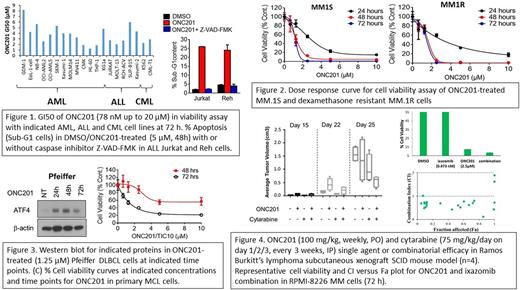Abstract

ONC201, founding member of the imipridone class of small molecules, is currently being evaluated in advancer cancer clinical trials. We explored single agent and combinatorial efficacy of ONC201 in preclinical models of hematological malignancies.
ONC201 was evaluated in 20 human leukemia cell lines (Figure 1): 13 acute myeloid leukemia (AML), 5 acute lymphoblastic leukemia (ALL) and 2 chronic myelogenous leukemia (CML) cell lines. We observed a dose-dependent decrease in cell viability in AML, ALL and CML cells (GI50 1-8 µM). ONC201 also decreased cell viability in 2 primary chronic lymphocytic leukemia (CLL) patient samples with 48-72h treatment. Dose- and time-dependent induction of apoptosis (caspase-3 cleavage), inhibition of Akt and Foxo3a phosphorylation was observed in AML cells treated with ONC201 for 24-48 hr. Sub-G1 analysis confirmed that ONC201 induced apoptosis in ALL cells and a pan-caspase inhibitor reduced ONC201-mediated apoptosis. ONC201-mediated apoptosis in ALL cells involved PARP cleavage and caspase-9 activation. Anti-apoptotic Bcl-2 family members Bcl-2 and Bcl-xl were downregulated while the pro-apoptotic Bcl-2 family member Bim was upregulated in response to ONC201 treatment in ALL cells. ONC201 also downregulates the inhibitor of apoptosis (IAP) family proteins cIAP1 and cIAP2 in ALL cells, which are known to confer a poor clinical prognosis.
Low micromolar concentrations of ONC201 also reduced multiple myeloma (MM) cell viability in a time- and dose-dependent manner. ONC201 reduced cell viability and induced apoptosis in dexamethasone-resistant MM.1R cells with efficacy comparable to dexamethasone-sensitive MM.1S cells (Figure 2). ONC201 caused activation of the integrated stress response (ISR) pathway, as observed with induction of ATF/CHOP in MM cells. XIAP is highly up-regulated in MM cells and sownregulation of IAP family proteins induces apoptosis. ONC201 treatment of MM cells resulted in a dose-dependent decrease in the anti-apoptotic proteins XIAP, cIAP1 and cIAP2.
Next, ONC201 was evaluated in 33 human lymphoma cell lines: 3 anaplastic large cell lymphoma (ALCL), 7 Burkitt's lymphoma, 2 cutaneous T-cell lymphoma (CTCL), 8 diffuse large B-cell lymphoma (DLBCL), 1 MCL, 2 nodular sclerosis (NS) and 10 other lymphoma cell lines. ONC201 demonstrated low micromolar range efficacy (GI50 1-6 µM) across all lymphoma subtypes. Low micromolar concentrations of ONC201 reduced cell viability of MCL and DLBCL cell lines and primary cells in a time- and dose-dependent manner (Figure 3). ONC201 caused activation of the ISR pathway, as observed with induction of ATF4 in Pfeiffer DLBCL cells. In patient-derived MCL cells, ONC201 reduced cyclin D1 expression, a diagnostic feature of MCL.
We then tested the efficacy of ONC201 in combination with approved therapies in hematological malignancies in vitro and in vivo. ONC201 demonstrated synergistic reduction in cell viability in combination with cytarabine confirmed by combination indices in AML cell lines CMK, THP-1, HL60 and ALL Kasumi-2 cells. ONC201 combined with cytarabine in a Burkitt's lymphoma xenograft model exhibited superior tumor growth inhibition compared to either agent alone (Figure 4). ONC201 demonstrated synergistic reduction in cell viability in combination with 5-azacytidine that was confirmed by combination indices in AML cell lines HL-60, MOLM14 and MV411. ONC201 synergistically reduced cell viability in combination with dexamethasone or ixazomib in RPMI-8226 MM cells. ONC201 in combination with bortezomib synergistically reduced cell viability in KARPAS 299 ALCL cells and RPMI-8226 MM cells and improved apoptosis induction in UPN2 MCL cells. ONC201 combined with bortezomib was evaluated in a Burkitt's lymphoma xenograft model. Histological evaluation of tumor xenografts revealed a reduced tumor cell density at 3-4 weeks and enhanced CHOP induction at 48 hours with combination treatment compared to either agent alone. The combination treatment did not result in body weight loss.
These results serve as a rationale for ongoing ONC201 single agent trials in relapsed/refractory acute leukemia (NCT02392572), non-Hodgkin's lymphoma (NCT02420795), MM (NCT02609230) and combination trial with dexamethasone in MM (NCT02863991). Our findings provide pharmacodynamic biomarkers and identify synergistic combinatorial regimens that are well tolerated and can be explored in the clinic.
Prabhu: Oncoceutics: Employment, Equity Ownership. Grupp: Novartis Pharmaceuticals Corporation: Consultancy, Other: grant; Adaptimmune: Consultancy; University of Pennsylvania: Patents & Royalties; Jazz Pharmaceuticals: Consultancy. Oster: Oncoceutics: Employment, Equity Ownership, Membership on an entity's Board of Directors or advisory committees. Allen: Oncoceutics: Employment, Equity Ownership, Patents & Royalties. El-Deiry: Oncoceutics, Inc: Equity Ownership, Patents & Royalties.
Author notes
Asterisk with author names denotes non-ASH members.

This icon denotes a clinically relevant abstract


This feature is available to Subscribers Only
Sign In or Create an Account Close Modal